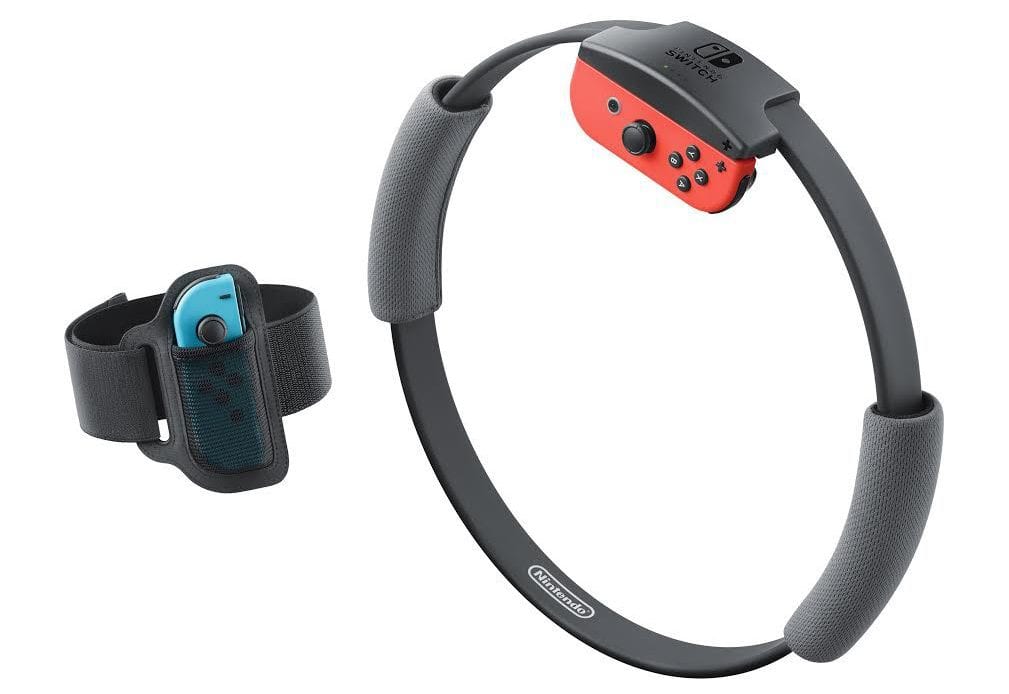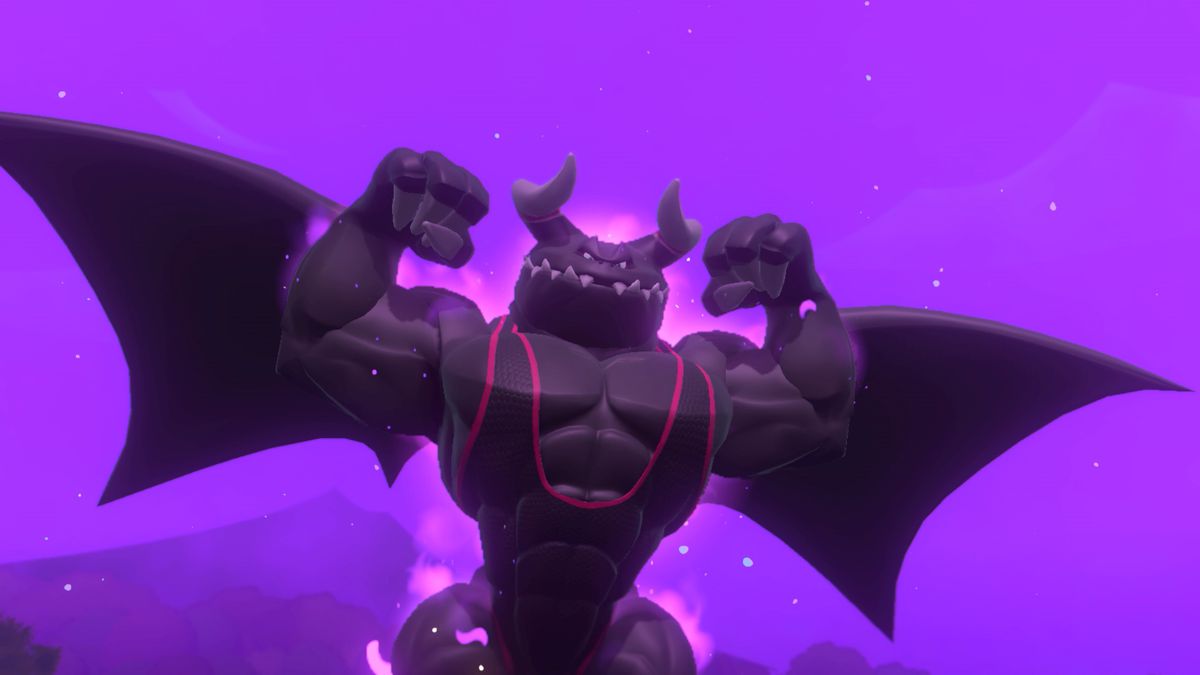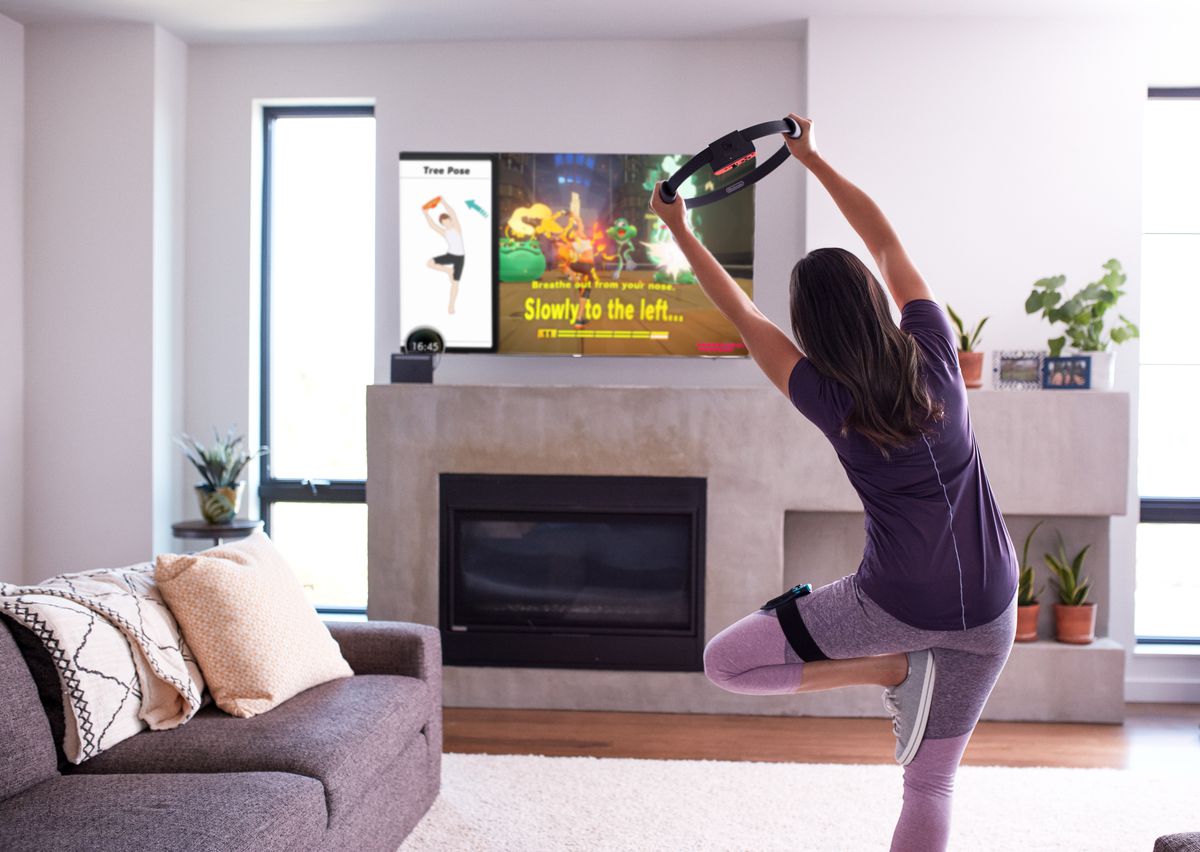

Like most fantasy adventures, Nintendo’s Ring Fit Adventure puts you in the role of a newly established hero attempting to rid a magical realm of a freshly arisen evil. You venture through various levels, fight nefarious monsters, and earn money and experience along the way to improve your skills. It sounds like a typical role-playing game, but Ring Fit Adventure is far from typical. You don’t explore and battle by using buttons and joysticks: instead, you exercise your way through a lush fantasy landscape. It’s like Wii Fit crossed with Final Fantasy, and it sits alongside Labo as one of Nintendo’s most unexpectedly interesting experiments.
Ring Fit Adventure, which Nintendo teased last week, launches in October for the Switch. It consists of three main pieces. There’s the game itself and two accessories: a leg strap and a flexible ring that Nintendo has dubbed the Ring-Con, which is essentially a high-tech resistance band. In order to use both, you need to slot a Joy-Con controller inside of each, and then you control the game primarily through your movements. I played through multiple sections of the game earlier this week, and the most surprising thing was how expansive and cohesive the experience felt. Yes, it’s exhausting and will make you sweat, but it’s also a large, fleshed-out adventure at the same time. And those two seemingly disparate elements never felt at odds with each other during my time with the game.
Ring Fit Adventure is the first fitness-focused game I’ve ever played with an actual story. You play as a hero dressed like a gym rat, and you partner up with a sentient ring named Ring to fight off an incredibly swole purple dragon in a leotard, who is infecting the fantasy realm with darkness. (Nintendo says that the dragon was designed to represent the negative aspects of gym culture, like ultra competitiveness. In other words, he’s a fantastical bro.) The experience is structured sort of like a Super Mario game, as you go through a series of levels spread across different settings, punctuated by boss battles.

So how exactly does a fitness adventure RPG work? First, you wrap the leg strap around your left leg, and then hold the ring in front of you sort of like a steering wheel. Each level is on rails, with a few branching paths to explore. To move forward, you jog on the spot, and you turn by pointing the ring in whatever direction you want. To move faster, you simply jog faster. If you reach an obstacle to jump over, you point the ring down, squeeze it to gain power, and then release in time to jump. As you run, you can shoot bursts of air to smash crates, which again is done by quickly squeezing the ring and pointing at your target. You can also vacuum up coins hidden in each level by stretching out the ring to suck them in.
It can get intense even though the levels last just a few minutes; I found myself sweating after just two of them. You never really stop moving, and doing the various ring-related activities while simultaneously jogging is a decent workout. Things get even more challenging when you factor in the battles. They work sort of like a classic Japanese role-playing game. You’ll see an enemy in the level, and as soon as you touch it you’ll be thrust into turn-based combat.
To attack, you can choose from a variety of exercises. To do one attack, I had to hold squats for a few seconds, following on-screen instructions, while another involved doing yoga-style poses on the ground. After a few reps, you then switch to defense: in order to fend off attacks, you stand, press the ring against your abdomen, and hold, forming a shield to absorb your enemy’s barrage. This repeats until either you or the bad guys are defeated.
From what I played, the RPG elements felt fairly deep. While I only had access to four attacks initially, you’re able to unlock more throughout the game, each color coded to match the type of exercise, like shoulders, legs, or cardio. Each color is strong against similarly colored enemies, essentially forcing you to switch up your routine and not focus exclusively on any one area of your body. A Nintendo rep told me that if you played for an hour a day, it’d take between three to four months to finish the campaign.
During my time with the game, the accessories worked perfectly. The leg strap is simple enough, reminiscent of the strap from the 2009 Wii fitness game EA Sports Active. I had to retighten the velcro strap a few times after vigorous jogging, but it was comfortable enough. The main attraction, though, is the aptly named Ring-Con. The Switch’s Joy-Con controller slots into it much the way it slides into the Switch itself. It’s a solid piece of kit that you can work hard; during certain portions of the game I had to really squeeze it, and it held up nicely.

There are two removable pads where your hands rest, and Nintendo says they’re washable, so you don’t have to worry too much about sweaty palms. The ring has sensors to keep track of your movements, while the Joy-Con’s IR sensor is used to measure your heartbeat after each level; you simply place your thumb over the sensor and hold it for a few seconds. (Nintendo says that the game will be compatible with the upcoming portable-only Switch Lite, but you’ll need to purchase separate Joy-Con, making it a somewhat pricey option.)
There’s more to Ring Fit Adventure than just the story mode. Outside of that, it starts to resemble something closer to a traditional fitness game. There’s a mode where you can go through various workout routines, including both individual exercises and sets that link together activities to work a particular body part.
There are also a number of mini-games that add a more playful element to working out. I played one that was essentially whack-a-mole, except you had to hit moles in a circular level by rotating the ring to find them, and either squeezing or stretching the ring to squash them. Another was called “Squattery” and was exactly what the name implies: you do pottery by squatting. Squats would lower or raise your position on a lump of clay, and you could then squeeze the ring to shape it. The goal was to match a predetermined shape as closely as possible. It’s very hard. Thanks to a high score leaderboard, this mode feels almost like a fitness-oriented party game. Mario Party, but with cardio.

Despite the generic name, Ring Fit Adventure looks and feels like a premium Nintendo experience. It’s clear a lot of thought has gone into the game. Here are two examples of some of the smaller touches I noticed:
- The game has a “quiet” mode, so that if you live in an apartment or want to play at night without waking anyone, you can do a series of squats instead of jogging to move through the levels.
- The game offers fairly intuitive feedback during adventure mode. When you’re doing your workout correctly — jogging at the right speed, or following exercise instructions properly — your character’s hair will catch fire. The bigger the fire, the better you’re doing.
Wii Fit remains one of Nintendo’s best-selling games. The original Wii titles sold a combined 43 million copies, and it’s clear the company wants to tap into that sizable market with Ring Fit Adventure. (Companies like Microsoft have attempted, and largely failed, to replicate that success.) The difference here, though, is that Ring Fit Adventure is much more of a typical video game, which could potentially help it reach not only fitness fans, but the millions of traditional Nintendo fans who already own a Switch. It’s a chance for the increasingly broad Switch audience to get even bigger. More than that, though, it feels quintessentially Nintendo: it’s unexpected, strange, and — most importantly — fun.
Ring Fit Adventure launches on the Switch on October 18th for $79.99, including both the game and accessories.
Author: Andrew Webster
Source: Theverge



